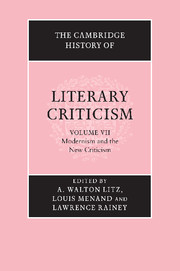12 - Kenneth Burke
from THE NEW CRITICS
Published online by Cambridge University Press: 28 March 2008
Summary
Nothing human is alien to Kenneth Burke. He is the least confined of modern critics. It is not simply that he writes about everything: he tries to encompass everything within a system or systems of explanation that have the effect of conservation. In the narrow political sense, Burke is by no means a conservative, and yet one might say, that he is the most ‘conservational’ of critics. The trajectory of Burke's career from the first collection of essays Counter-Statement to The Rhetoric of Religion is a movement of increasing encompassment of all branches of knowledge: literature, sociology, philosophy, linguistics, theology etc. ‘Branches of knowledge’ is misleading, because of the peculiarly idiosyncratic appropriation of them.
How to encompass this most encompassing, yet most personal of critics? The question has been raised, particularly by writers hostile to his enterprise, about whether indeed Burke qualifies as a literary critic. Thus Marius Bewley, one of his severest critics, has noted, ‘how easily, without an exacting critical conscience, Burke's theory moves through art to propaganda, how easily the literary merges into the revolutionary critic’. The occasion for the charge is an extended passage in Attitudes Toward History of which the following sentences should serve:‘Our own program, as literary critic, is to integrate technical criticism with social criticism (propaganda and didactic) by taking the allegiance to the symbol of authority as our subject … And since the whole purpose of a “revolutionary” critic is to contribute to a change in allegiance to the symbols of authority, we maintain our role as “propagandist” by keeping this subject forever uppermost in our concerns.’ Burke's role as revolutionary critic may be only a phase or aspect of his total performance, but it is taken to be expressive of a characteristic disposition in the performance.
- Type
- Chapter
- Information
- The Cambridge History of Literary Criticism , pp. 248 - 259Publisher: Cambridge University PressPrint publication year: 2000



